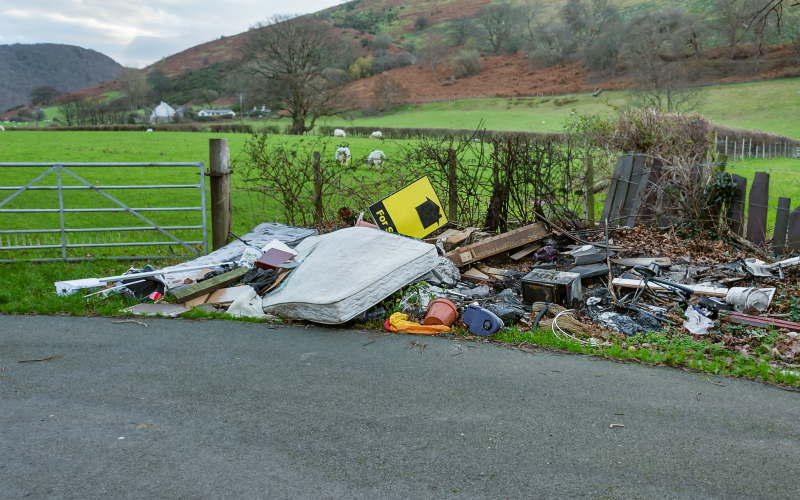
It has been estimated that it costs Local Authorities £8.9 million each year to clear up fly-tipping from Council owned land. Fly-tipping can also cause misery for private land owners, with farmers and other land managers having to bear their own costs of clearing rubbish dumped on their land, estimated to cost them around £1,000 each year.
The Environmental Protection Act 1990, as amended, makes it a criminal offense for any person to deposit controlled waste, knowingly cause or knowingly permit controlled waste to be deposited without a valid environmental permit. Fly-tipping is a wide ranging offence, covering dumping of a single black bin bag, to up to thousands of tonnes of waste. If a person is found guilty of the offence they can be issued with a fixed penalty notice of £200, or could be potentially sentenced to imprisonment and risk a fine of up to £40,000. Penalties can be issued by the police, by local authorities and since 1st April 2005, by public bodies including Loch Lomond and the Trossachs National Park.
However, the number of people prosecuted in Scottish Courts for fly-tipping offences has been in steady decline over the past 5 years, according to a recent Scottish Government report, with only six successful prosecutions in 2018 compared with thirteen in 2014. There is believed to be widespread under-reporting of fly-tipping incidents on farms, and private landowners are urged to report all incidents to help the police and authorities build a true picture of the scale of the problem.
In the meantime, interested parties have advised that farmers and landowners can help themselves by taking a range of anti-fly-tipping steps. These include:
1. Making physical improvements to entry points, such as fitting gates and barriers, placing logs across field entrances and improving visibility. Install or improve lighting and consider placing appropriate signage or CCTV, which can act as a deterrent – even if there is no film in the camera.
2. Work with your neighbours, local businesses and any existing partnerships to keep a lookout and report incidents. If you do find waste fly-tipped on your land, then record as many details as possible about the waste and when you found it. If possible, photograph the waste. Do not move the waste or remove any evidence from it until the authorities have been notified.
3. Secure the waste so that it cannot be interfered with or added to. Exercise caution as some fly-tipped waste can be hazardous. Do not open bags or drums and be aware that piles of soil may be contaminated or hide dangerous material. Do not move fly-tipped waste from your land onto the roadside – this in itself is considered to be fly-tipping.
If you do see anyone dumping rubbish illegally, then call the Dumb Dumpers Stop Line on 0845 2 30 40 90 or visit Dumb Dumpers.
For further information and advice on managing your land and controlling fly tipping, please contact Rebecca Ellwood or a member of our Land and Rural Business Team.
